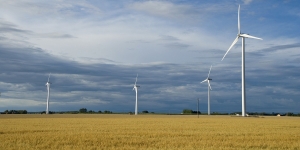Minimum Regulations for Wind Facilities

During the 2018 session, the Tennessee Legislature established minimum regulations for wind facilities, Public Chapter Number 825. These regulations include, but are not limited to, a minimum setback requirement (i.e., facilities must be set back from any non-participating landowner’s property line equal to 3.5 times the total height of the turbine structure, from base to maximum height of the blade tip) and a noise limit (i.e., no turbine[s] may exceed 35 decibels [dBAs] at a non-participating landowner’s dwelling or 45 dBAs at a non-participating landowner’s property line). Additionally, any permit applicant must first establish financial security of 100% of the total cost to decommission and remove the facility. These requirements apply to all wind facilities constructed or redeveloped on or after April 24, 2018, the effective date of this legislation.
This legislation also tasks the Municipal Technical Advisory Services and County Technical Assistance Services (MTAS and CTAS, respectively), local governments, and the Tennessee Public Utility Commission (TPUC) with the following responsibilities:
- MTAS and CTAS must disseminate model legislation for use by local governments interested in establishing conditions on the issuance of permits for the construction and/or expansion of wind facilities.
- For questions regarding model legislation, please contact MTAS at (865) 974-0411 and mtas@tennessee.edu or CTAS at (615) 532-3555 and ctas@tennessee.edu.
- Local governments may adopt regulations (e.g., ordinances and rules) on wind facility construction and operation through a two-thirds vote by their local legislative bodies.
- Local governments adopting regulations shall furnish a certified copy of the local legislation to the Tennessee Department of Environment and Conservation (TDEC). Certified copies shall be submitted to TDEC.OEP@tn.gov.
- These local governments must also submit a yearly report to the Agriculture and Natural Resources Committee of the House of Representatives and the Energy, Agriculture, and Natural Resources Committee of the Senate, detailing the number of approved and denied permits, results of environmental impact assessments, and data on all wind facilities.
- TPUC is tasked with administering “certificates of public convenience and necessity” to wind facility construction projects before their permitting by local governments. These certificates may not be issued to wind facilities that are taller than 350 feet (from base to blade tip) on mountain ridges 2,500 feet mean sea level or 500 feet or more above mean sea level of the adjacent valley floor. However, this limitation does not apply to turbines shorter than 100 feet tall that generate electricity to be consumed on-site. After receiving a certificate of public convenience and necessity from TPUC, local governments may award, revoke, or deny wind facility construction permits, contingent on first providing public notice and holding a public hearing prior to making a decision on the permit application.
- For questions regarding certificates of public convenience and necessity, please contact TPUC at 1-800-342-8359.
Once a local government adopts, certifies, and submits to TDEC any regulatory wind facilities legislation, that legislation will be added to this webpage for public reference. Please contact TDEC.OEP@tn.gov with questions on this process.
• Cumberland County Wind Regulations
• Gibson County Wind Regulations
This Page Last Updated: April 6, 2023 at 7:28 PM